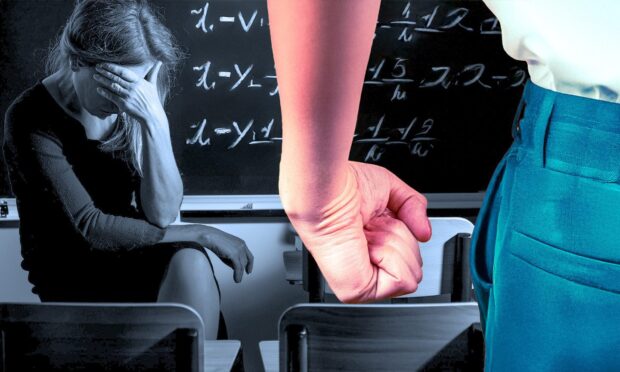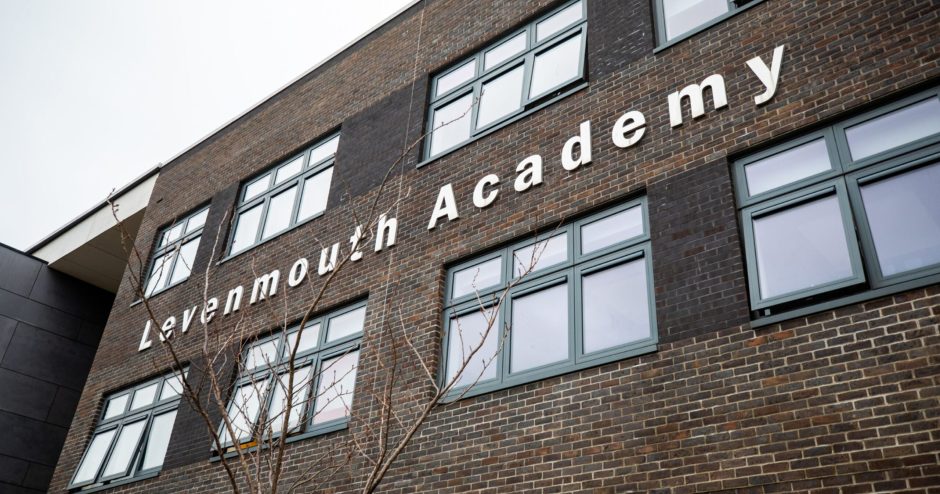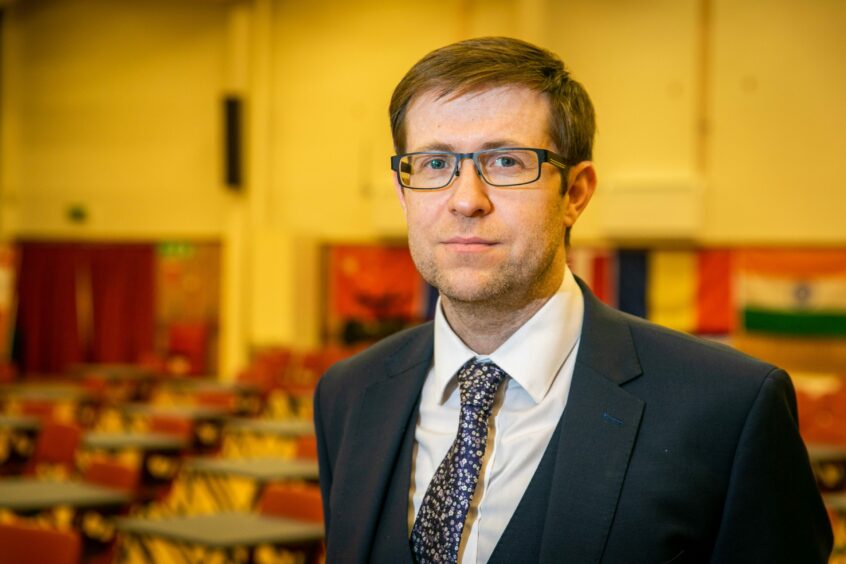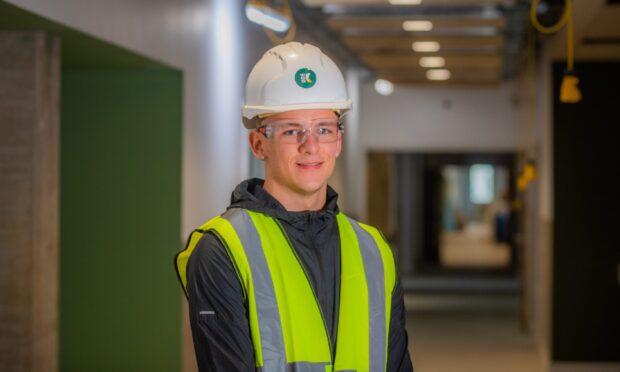A Fife teacher injured splitting up a fight was shocked to find they were expected to teach one of the pupils involved the next day.
They and a fellow teacher hurt in another incident are speaking out to illustrate the violence and aggression they say has become normalised in schools.
“There needs to be a culture change where violence isn’t tolerated,” the teacher said.
They were among 94% of teachers who responded to a survey on Fife school violence who claimed to have been involved in violent or aggressive incidents in the last four years.
The teacher intervened when two pupils were kicking and punching each other outside their classroom.
No one else was around and the pupils were ignoring their pleas to stop.
“I reached in to try to separate them and I was kicked hard on the arm,” they said.
Teaching pupils who have hurt them
Despite needing minor surgery the teacher, who wishes to remain anonymous for fear being identified might affect their job, tried to return to work the next day.
But they said: “When I arrived it was obvious that I was going to be expected to teach one of the pupils who had been fighting.
“I didn’t know if they were the one who had kicked me.
“The stress of it all was too much and I had to go off sick.
“When I went back to school both of the pupils who had been fighting were placed in my class.”
The teacher has had therapy as a result of the incident.
They said: “I want to keep teaching but I can’t do it if it continues like this.
“I think most people would be shocked to know the extent of violence now in schools.
“Violence has become normalised and many teachers across my school have been injured.”
‘They went into a rage’
A similar situation occurred for the second teacher, who was injured by a heavy object thrown by a secondary school pupil.
The additional support needs teacher said: “They went into a rage and started throwing things around, including large, heavy pieces of equipment.
“One of the objects they threw hit me and narrowly missed another pupil.
“The class was evacuated and eventually the pupil stormed off.”
After a couple of days off the pupil was back in the teacher’s class.
“I was not ready for this pupil to be back in my classroom so soon.
What should teachers do when violence occurs?
“We knew they had been violent at home previously. They showed no remorse for their behaviour, which was concerning.
“No one checked how we felt about the pupil being back in class with us, or whether I was fit for work, which should be standard procedure.
“It took a couple of months for my physical injury to fully heal.”
The pupil eventually got the support they needed, the teacher said.
But they added: “When violent incidents occur, our last resort is to evacuate the classroom.
“We have been told not to intervene if there is an assault, but what are we supposed to do?
“We’ve had pupils trying to strangle members of staff.”
Fife schools violence survey findings
Headline findings of the survey conducted by the Fife branch of the EIS teaching union were:
- Almost all (94%) of respondents had been involved in violent and aggressive incidents in the last four years
- Six in 10 had been assaulted in the last four years
- Almost half said violent and aggressive incidents occurred daily in their schools
- Six in 10 had considered quitting teaching because of disruptive, challenging or violent pupils
Teachers are being pushed, shoved, punched, bitten, spat at and struck with objects, according to Fife EIS spokesman Graeme Keir.
Where aggression is non-physical, he said, it’s most often threats, mockery, swearing and sexist behaviour.
The survey was undertaken to gauge the success of an action plan implemented by Fife Council last year to tackle violence in schools.
While Fife EIS said progress had been made, it said urgent action was still required.
Mr Keir said: “These figures show there is a real and sustained crisis in many Fife schools.
“Violence and aggression is completely unacceptable in our schools and teachers have been working flat out to address the issues.
“However, all teachers know that action plans and devoted teachers cannot alone alleviate these problems unless there is also an increase in staffing.”
Jane McKeown, Fife EIS secretary, said: “We’ve been working constructively with Fife Council for some time on these issues.
“We have made some progress but these survey results show clearly that much work is still to be done, and the work is urgent.”
What is needed to help teachers deal with unruly pupils?
Scottish Liberal Democrat education spokesperson Willie Rennie believes teachers need greater powers to deal with disruptive behaviour.
He said: “Violence in any environment is distressing and ugly but in a place where minds should be focused on improvement and learning it is deeply alarming.
“It is also distressing that so many teachers are being driven to consider leaving the profession because of circumstances no one should face in their place of work.
“I have spoken directly with many teachers, parents and other staff in schools who have faced violent incidents. I believe there is a broad recognition of the problem, but we need to see real action.
“Teachers need to be empowered to control their class with the support of management and the power to enforce boundaries and implement consequences for poor behaviour.
“There is clearly a place for restorative discussions between teacher and pupil, but this cannot be the limit of a teacher’s toolkit.
“I also hope that greater investment in education psychologists in Fife will help to deal with the underlying causes of violence.”
What is being doing to tackle Fife school violence?
Fife Council says the issues reported are shared by schools across Scotland and are taken very seriously.
Donald MacLeod, executive director of education, said: “Any form of violence is unacceptable, and we’re committed to safe working practices and training for our staff.
“Some of our schools are facing specific challenges and we give targeted support to schools where or when it’s needed.”
Levenmouth Academy, in Buckhaven, is among those where bespoke plans have been implemented to tackle Fife school violence.
Mr MacLeod said: “Across our schools a huge amount of work is underway to tackle violence and we’re working with partners including police, Fife NHS, and [Fife] Health and Social Care Partnership.
“Together, we are putting a number of different programmes, practices and actions in place.
“The safety and wellbeing of all our children and staff in every Fife school is a priority and we will continue to work with all our school communities to make sure our staff and young people have a positive experience at school.”
How successful has action been?
Work to address issues has made some progress, he said, but there remains much to be done.
“We’ll keep working until every member of staff feels safe and well supported, and able to respond effectively and confidently to the daily challenges of school life.
“We’ll continue to strengthen our approaches to both professional learning and the management of pupil behaviour across our schools.
“We recognise that this is a national issue and not unique to Fife.
Parenting techniques need support
“It requires a whole society response, including support from families and for parents and their parenting techniques.
Well-developed systems for reporting incidents are in place, he said.
“Collated reports of incidents are shared with teams from across education services to ensure we provide the best support and response that we can.
All education staff have access to a comprehensive professional learning package which includes de-escalation techniques and trauma informed practice.
“A whole system review is underway across education services, focussing on our approach to supporting young people with additional needs including those whose behaviour is more challenging.
“This work will continue to be a main priority for the foreseeable future.”















Conversation